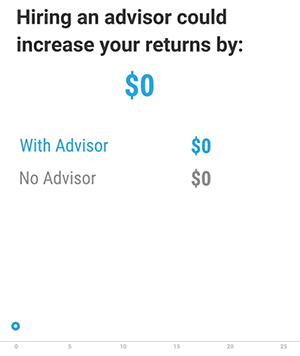




June 2022
Planning for retirement involves major life decisions that can determine your financial trajectory for years to come.
Are you planning to travel, spend time with family, and just relax? The choices you make now could affect whether those dreams become reality.
Consider this: A 2020 Northwestern Mutual study found that 71% of U.S. adults admit their financial planning needs improvement. However, only 29% of Americans work with a financial advisor.1
The value of working with a financial advisor varies by person and advisors are legally prohibited from promising returns, but research suggests people who work with a financial advisor feel more at ease about their finances and could end up with about 15% more money to spend in retirement.2
A Vanguard study found that, on average, a hypothetical $500K investment would grow to over $3.4 million under the care of an advisor over 25 years, whereas the expected value from self-management would be $1.69 million, or 50% less. In other words, an advisor-managed portfolio would average 8% annualized growth over a 25-year period, compared to 5% from a self-managed portfolio.3

SmartAsset’s no-cost tool simplifies the time-consuming process of finding a financial advisor. A short questionnaire helps match you with up to three fiduciary financial advisors each, legally bound to work in your best interest. The whole process takes just a few minutes, and in many cases you can be connected instantly with an expert for a free retirement consultation.
SmartAsset Awards & Accolades
Management Solution
2020 FINALIST
Technology Company - NY
FINTECH AWARDS - 2021
for Personal Finance
2019
Advisors are rigorously screened through our proprietary due diligence process.
Being aware of these seven common blunders when planning for retirement can help you find peace of mind, and potentially avoid years of stress.
7 Crucial Retirement Planning Mistakes
If you want your maximum Social Security benefits, you’ll need to work until your “full retirement” age.
But benefits at age 62, 66 or 67 are not your maximum benefits. The maximum Social Security retirement benefit kicks in at age 70. If you claim before, you're not getting your full entitlement.
Each year after full retirement, your payout increases by a certain percentage based on specific criteria. To maximize on this strategy, we recommend holding off until you are 70 -- if your situation allows. Payments will be the highest possible, increasing by 8% each year you wait.
While this strategy will help you collect the highest Social Security benefit, every situation is different. Consult a financial advisor to figure out how and when Social Security benefits should factor into your unique retirement plan.
If you find yourself strapped for cash, taking out a 401(k) loan might be your only option. However, a 401(k) loan shouldn’t be the first place you look for extra money.
While any interest you pay on the loan is paid back into the account, you also have to consider the opportunity cost of missing out on market returns while the money is absent from the account. You also run the risk of having to pay income taxes and withdrawal penalties if you’re unable to pay it back within five years or before leaving your job.
Always speak with a financial advisor before considering this option. You can get matched with up to three fiduciary financial advisors using this free tool. Fiduciaries are legally obligated to work in your best interest.
You can start withdrawing money from your 401(k) when you turn 59 1/2, but that doesn't mean it's a good idea. The law doesn't require you to start taking Required Minimum Distributions until you turn 72, so this is time your money can keep growing with compound interest. Consider using other income streams first.
If possible, put off withdrawing money from your Roth IRA as long as possible. You paid taxes up front so you can take money out of your Roth IRA and it won’t count as taxable income.
Your Roth IRA also will continue to grow tax-free as you tap into your other accounts. Since a Roth IRA holds after-tax funds and the IRS doesn’t need to tax it again, you also don’t need to take Required Minimum Distributions. This account can keep growing for as long as you don't touch it.
By definition, a fiduciary is an individual who is ethically bound to act in another person’s best interest.
All of the financial advisors on SmartAsset’s matching platform are registered fiduciaries. If your advisor is not a fiduciary and constantly pushes investment products on you, use this no-cost tool to find an advisor who has a legal obligation to act in your best interest.
You can delay claiming your own Social Security benefits and reap half of your partner’s payout if your marriage (current or not) has lasted a minimum of 10 years (although several conditions apply). This can be beneficial if your spouse was a higher earner, since the calculation for spousal benefits will be based on the spouse’s salary. Widows and widowers are also able to benefit from a spouse whose earnings were higher.
It goes without saying that planning for retirement is extremely important and incredibly unique for every single one of us. Making the most informed financial decisions as early as possible can help reap huge benefits down the road. Short-sighted, emotion-driven investment decisions can lock in losses, not to mention the complicated tax implications of investing over the long term.
Financial advisors are well-versed in retirement planning and can help you determine where to invest, when to elect your benefits, what order to withdraw funds and how to best avoid tax traps.
Chances are, there are several highly qualified financial advisors in your town. However, it can seem daunting to choose one.
Our no-cost tool makes it easy to find a vetted advisor so you can make an informed decision, compare, and choose the right one for you.

